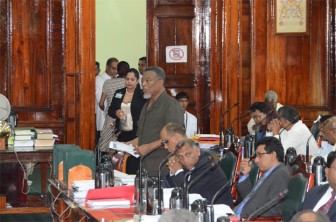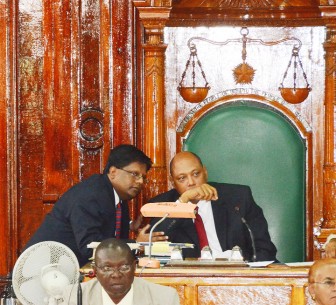Speaker of the National Assembly Raphael Trotman yesterday ruled that a move by the opposition for the withdrawal of a financial paper was out of order, clearing the way for the eventual approval of government’s supplementary budget spending from last year.
The Supplementary Appropriation Bill No. 1 of 2012 was passed without the inclusion of four items voted down by the opposition from one of its two supporting financial papers—a move that Trotman said was not out of order, while adding that Finance Minister Dr Ashni Singh may resubmit them to the House at a later date.

The bill was supported by Financial Paper No 7/2011, which sought a request for supplementary provisions amounting to $2.241 billion, while Financial Paper No 8/2011 was for $3.471billion. The former was passed without the four items, while a vote was called during consideration of Financial Paper No 8/2011, which saw the AFC abstaining, thereby allowing the government to use its majority to carry it forward, leading to the passage of the bill.
Trotman had received a letter from Prime Minister Samuel Hinds requesting a ruling on a Motion that Shadow Finance Minister Carl Greenidge had proposed at the last sitting for the withdrawal of Financial Paper No 8/2011 and against four items in Financial Paper No 7/2011.
Hinds argued that Deputy Speaker Deborah Backer, who presided over the February 16 sitting, “allowed” Greenidge’s Motion, seconded by Khemraj Ramjattan of the AFC, for the withdrawal of Financial Paper No 8/2011.

“Honourable members, I have had ample time to examine the concerns raised by the Honourable Prime Minister and after reading the Erskine May and other rules of procedure, and with the advice of the Clerk of the National Assembly and that of another jurisdiction and even that of a former Clerk, I would like to state the following:
“Mrs. Backer did not ‘allow’ Mr. Greenidge’s Motion for the withdrawal of Financial Paper 8. The Motion was merely moved and seconded after which Mrs. Backer heard arguments for and against the admissibility of the matter. I am informed by Mrs. Backer that she suspended and thereafter sought an adjournment to advise herself on the admissibility of the Motion.”
He said that to allow a Motion, in his opinion, is to put a question to the House. “This was not done. The Clerk of the National Assembly shares my opinion,” he said, adding that Backer was right to seek guidance on the matter instead of proceeding in contravention to the Standing Orders.
“With respect to [Greenidge’s] Motion to withdraw Financial Paper No. 8, it is my Opinion and that of the Clerk of the National Assembly that Greenidge’s Motion for the withdrawal of Financial Paper No. 8 was out of order and I so rule,” he declared.
Trotman said that Standing Order 78 clearly sets out the procedure to be followed when Supplementary Estimates are in the House. “A Motion to withdraw is not one of the stated procedures, except that the Minister who introduces it may withdraw or defer it, if he or she chooses.
The Speaker explained that Standing Order 36 (1) says that a Motion can only be withdrawn at the request of the mover, provided that there are no dissenting voices. He said that in accordance with Standing Order 78 (3), when the Assembly resolved itself in Committee of Supply to consider a Financial Paper and a Minister, having signified Cabinet’s consent, moves “that the National Assembly approves of the proposal or proposals set out [in the financial paper], any member may move to add words either to leave out an item or one or more proposals.”
He said that the intent of the Motion was not to abandon the consideration of the Financial Paper but for the submission of more details according to the Prime Minister. “This would seem reasonable if the wording of the Motion did not include withdrawal,” he said.
The Speaker also commented on the approval in the Committee of Supply of Financial Paper 7/2011. He said that the Prime Minister in his letter challenged the propriety and legality of the removal of four agency heads. In giving his ruling, Trotman said that it was his opinion that the Assembly, or a majority thereof, is within its right to leave out or exclude any item or sub head of a Supplementary Estimate or Statement of Excess.
“The manner in which the House dealt with Financial Paper No. 7/2011 seems to be in order,” he said.
Trotman said that this is “exactly why” the question is put for adoption by the House for members to exercise their constitutional function of supporting or voting against a proposal. “A question is put to the Assembly for a decision and is determined by a majority and that was the case here. Voting against the items was not wrong,” he said.
Trotman added that the Prime Minister, in his letter, made reference to Standing Order 113 that refers to usage in the British House of Commons for matters not provided for in the Standing Orders. “I observe that where there is a lacuna, that we resort to the application of Standing Order 113. However, it appears to me that the procedure followed in dealing with Financial Paper No. 7 is consistent with our Standing Orders. There is no need therefore, to import rules from other jurisdictions,” Trotman said.
“The Prime Minister’s application of many of the Standing Orders he quoted seems to be much flawed. What he seems to be advocating is that Financial Papers must not be subject to affirmative or negative vote in the Assembly. In that case they should only be laid for the information of the House,” he said.
“I therefore rule that the exclusion of four sub-heads… was duly, and properly, done by the Assembly in keeping with the Standing Orders. A decision to vote for or against a Supplementary Estimate or a head or sub head thereof, cannot be reversed by the Speaker, though I am of the opinion that the Honourable Minister of Finance or his designate may reintroduce them for consideration,” he said.
At the last sitting, the opposition APNU and AFC voted against approving an additional $25.5 million spent for the conferment of National Awards and other events hosted by the state; in this case the swearing in of President Donald Ramotar and the new Cabinet members late last year.
They also voted down a sought provision of $6.5 million for the provision of payment of overtime for staff of the General Register Office working during the second Claims and Objections period in the run up to national and regional elections last year.
Suffering a similar fate was a sum of $18.5 million for the provision of security equipment for the Guyana Police Force and against a sum of $29.1 million for the provision of mobilization payments on infrastructural works for the specialty hospital, for which the sum of $150 million had been allocated in the budget of 2011.
During the deliberations of the Committee of Supply, Minister of Finance Dr. Ashni Singh said that the $150 million that had been originally voted for the specialty hospital had not been spent. He explained that at the time of the preparation of the 2011 budget it was not clear how much funding the Government of Guyana would have been getting from the Government of India to finance the project.





